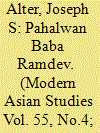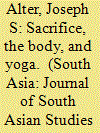|
|
|
Sort Order |
|
|
|
Items / Page
|
|
|
|
|
|
|
| Srl | Item |
| 1 |
ID:
179410


|
|
|
|
|
| Summary/Abstract |
In the view of many people, Baba Ramdev embodies the practice of modern yoga in twenty-first century India. A tremendously successful entrepreneur, infamous ‘godman’ with political ties, and a highly visible TV personality, he is also a vocal supporter of pahalwani (Indian wrestling) as a way of life and of wrestling in India as a national sport. Beyond sponsorship of tournaments and support for a new professional wrestling league, he promotes a form of modern, nationalistic masculinity that draws on the ‘ideals’ of yoga, competitive athleticism, ‘Hindu’ conceptions of embodied power, and fetishized Vedic asceticism. In complex and often contradictory ways, Baba Ramdev's embodiment of these ideals shapes the bio-morality of wrestlers as they train, compete, and endorse his products. Critically analysed in terms of gender theory, his sponsorship of wrestling belies deep contradictions in religious nationalism, middle-class modernity, and in the gendered morality of both wrestling as a sport and yoga as a form of practice.
|
|
|
|
|
|
|
|
|
|
|
|
|
|
|
|
| 2 |
ID:
114017


|
|
|
|
|
| Publication |
2012.
|
| Summary/Abstract |
In most general terms, hathayoga involves the internalisation and embodied literalisation of the Vedic fire sacrifice. Reflecting on the place of sacrifice in anthropological theory, and on the way in which sacrifice structures the relationship between humans and gods in terms of gift obligations, this paper explores the theoretical implications of hathayoga's embodied literalisation of a profoundly symbolic act. Although similar to various forms of ascetic renunciation, hathayoga is unique, it will be argued, in being structured as the physiological antithesis of religious ritual. Self-realisation based on the internalised yajna sacrifice undermines the binary structure of the sacred and the profane and makes god irrelevant. This raises theoretical questions concerning the social significance of a ritual that is anti-social on a number of different levels.
|
|
|
|
|
|
|
|
|
|
|
|
|
|
|
|
|
|
|
|
|